UNITED NATIONS:
Underscoring the urgency of resolving the decades-old dispute over the Himalayan state of Kashmir, Prime Minister Nawaz Sharif on Wednesday proposed to India a four-point peace initiative, aimed at addressing the causes of tensions between the two nuclear-armed arch nemeses.
Addressing the world leaders at the 70th anniversary session of the 193-member UN General Assembly, the prime minister proposed Pakistan and India formalise and respect the 2003 understanding for a complete ceasefire on the Line of Control (LoC) in Kashmir to be monitored by an expanded UN Military Observers Group in India and Pakistan (UNMOGIP).
“We propose Pakistan and India reaffirm that they will not resort to the use or the threat of use of force under any circumstances. This is a central element of the UN Charter; [That] steps be taken to demilitarise Kashmir; [and that both countries] agree to an unconditional mutual withdrawal from Siachen Glacier, the world’s highest battleground,” he said.
He said an easing of threat perceptions through such peace efforts will make it possible for Pakistan and India to agree on a broad range of measures to address the peril posed by offensive and advanced weapons systems.
However, the prime minister also urged New Delhi to desist from creating instability in Pakistan. “Wisdom dictates that our immediate neighbour refrains from fomenting instability in Pakistan,” he added. “The two countries should address and resolve the causes of tension and take all possible measures to avert further escalation.”
Apart from the Kashmir, Premier Nawaz covered a range of subjects.
“Muslims are suffering across the world: Palestinians and Kashmiris oppressed by foreign occupation; persecuted minorities; and the discrimination against Muslim refugees fleeing persecution or war,” he said. “The international community must redress these injustices against the Muslim people.”
Elaborating on the Kashmir dispute, the prime minister emphasised the need for consultations with Kashmiris, who are an integral part of the dispute, to evolving a peaceful solution.
Since 1947 the Kashmir dispute has remained unresolved, UN Security Council resolutions have remained unimplemented, and three generations of Kashmiris have only seen ‘broken promises and brutal oppression’, with over 100,000 losing their lives in their struggle for self-determination, he said. “This is the most persistent failure of the United Nations.”
Nawaz Sharif said on his assumption of office as in June 2013, he reached out to the Indian leadership in an effort to normalise relations with India, emphasising that the common enemy of the two countries was poverty and underdevelopment. “Cooperation, not confrontation, should define our relationship,” he said.
“Yet today ceasefire violations along the LoC and the working boundary are intensifying, causing civilian deaths including women and children,” the prime minister said, adding that the causes of tensions between India and Pakistan must be resolved.
The prime minister said Pakistan neither wanted to, nor was it engaged in, an arms race in South Asia. “We cannot, however, remain oblivious to the evolving security dynamics and arms buildup in our region, which obliges us to take essential steps to maintain our security.”
He said Pakistan as a responsible nuclear weapon state will continue to support the objectives of nuclear disarmament and non-proliferation. He said the country has maintained the highest standards of nuclear security and have established an effective regime to ensure the safety and security of its nuclear facilities and stocks.
“South Asia needs strategic stability and this requires serious dialogue to achieve nuclear restraint, conventional balance and conflict resolution,” he added.
Talking with reference to Afghanistan, he said Pakistan would persist in the endeavour to help resume the dialogue between Afghan government and the Taliban, which was stalled by certain developments leading to intensification of militant attacks.
He said Pakistan stood for promoting peace and stability in Afghanistan. “We are encouraged that the international community, including the major powers, desire continuation of the peace process in Afghanistan,” he added. “We can do so only if we receive the required cooperation from the Afghan government.”
Nawaz Sharif greatly appreciated China’s proactive role in promoting peace and prosperity in Afghanistan and the region. He said the China-Pakistan Economic Corridor (CPEC) will spur regional economic integration and bring prosperity to the entire region and beyond. “This is an inspiring model of South-South cooperation that should be emulated.”
The prime minister also spoke on the issue of terrorism and said the global threat cannot be defeated unless its underlying causes – including poverty and ignorance – are addressed. “Extremist ideologies must be opposed,” he said.
He said Pakistan, as the primary victim of terrorism, has lost thousands of lives, including that of civilians. “The blood that has been shed - including that of our innocent children - has reinforced our resolve to eliminate this scourge from our society,” he said. “We will fight terrorism in all its forms and manifestations, irrespective of who their sponsors are.”
He said the Operation Zarb-e-Azb had made substantial progress in eliminating terrorists. This operation, involving over 180,000 of our security forces, was complemented by an all-inclusive National Action Plan that encompassed police and security actions, political and legal measures and social and economic policy packages, aimed at countering violent extremism, he added.
Published in The Express Tribune, October 1st, 2015.


















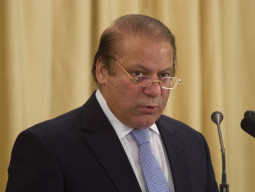
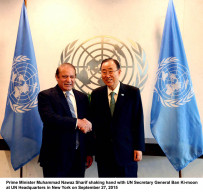
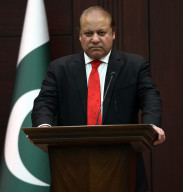



1711457205-0/US-Baltimore-Bridge-Collapse-(1)1711457205-0-270x192.webp)
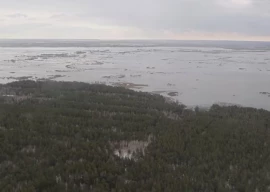
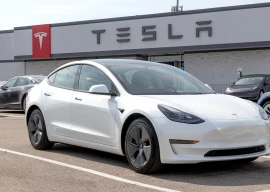














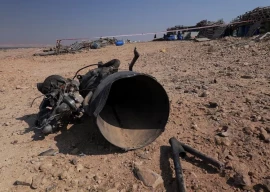






COMMENTS
Comments are moderated and generally will be posted if they are on-topic and not abusive.
For more information, please see our Comments FAQ